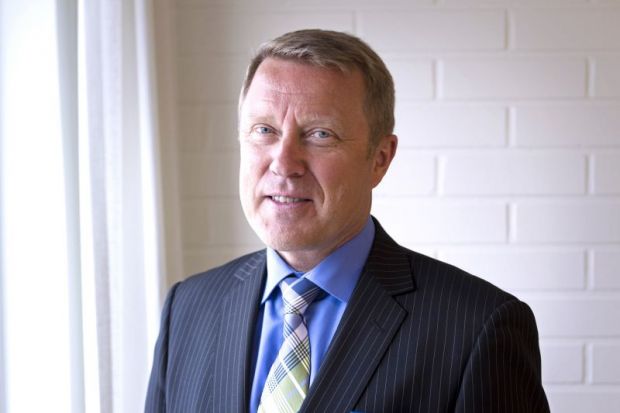In the first of a series of interviews with senior leaders at the world's best universities (those that feature in our World University Rankings), Jukka Kola, rector of the University of Helsinki, gives us the lowdown on who has inspired him in his higher education career, the biggest challenges facing universities in Finland, and his sleepless nights over the unavoidable restructuring of his institution's workforce.
What is the single most important issue affecting your university right now?
It has really been a tough and sad year. Only now are we recovering from serious cuts in funding, made by the new government, and the consequent drastic reductions of staff at our university. At the same time, our university has and wants to look forward to develop itself and guarantee future success, nationally and internationally.
Yes, we had to make major savings, but simultaneously we also aimed at diversifying our funding basis. Unfortunately, there is a wide gap and evident lack of understanding between political decision-makers and universities. Have we really entered into the post-truth politics, where there is no role for new, reliable research results and best knowledge provided by universities?
But it is also clear that we need to be better in communicating the value of higher education and high-profile research. Our narrative should be clearer, more impressive and concrete. Without this our future would be sad and bad. We want to develop our processes and contents by, for example, introducing a new degree system with broader bachelor's degrees, and with specialised master's degrees (the latter mainly fully taught in English). The aim is to meet the demands of future worklife and (international) students' expectations, that is, to create competitive education and degrees, in both and all ways.
Are you concerned about the potential long-term damage the government cuts could have on your research excellence and reputation?
Helsinki was hit hardest, as there was an additional targeted 5 per cent cut in our basic funding on top of the average cuts. It was very difficult to understand why this was so. Like the new Nobel prizewinner in economics, our alumni Bengt Holmström, said last year, he cannot understand why the best quality higher education institution in Finland was hit hardest.
Consequently, we had to reduce our staff by hundreds, and downsize the use of facilities and to re-organise our administration. Staff reductions were mainly in the administration and support activities as we prioritised education and research – the key functions of any university.
I am confident the we have a bright future ahead of us. The University of Helsinki is a strong multidisciplinary institution with excellent academic staff and 40 per cent external competed funding. We have launched considerable measures to diversify our income and accelerate ongoing fundraising campaign.
With our national and, more and more, international partners we are investing in our research strengths and focus areas. Our latest recruitment processes in, for example, the life sciences and digital humanities confirm that we are on the right track: there is more international interest than ever in our university. Some people, after the big funding cuts, have been talking about a "brain drain" from Finland. At the University of Helsinki, we anticipate and see a promising international brain gain.
Our major attraction is the top-quality research and infrastructure, topped with Finland’s stability, security and safety. With a special exotic attractiveness of being a very cool (not cold!) place indeed.
What was the most challenging project you have ever completed within higher education?
Obviously and of course, after the big, acute and unfair funding cuts, the change programme we introduced due to the future academic activities and financial situation. It has a scale of its own as it directly influences everyone working or studying at our university. But we won’t give up, even after these tough, compulsory decisions we were forced to make. We look at the good future.
Of course, it was the decision to reduce staff. When you rely on and build on talented people, and then you really do not have any other choice than making these difficult decisions. You have to live with many sleepless nights.
If someone else was taking over your role tomorrow, what’s the most useful advice you could give them?
I am sorry, but I have to admit that I do not think and plan this way – it feels like sort of giving up, when you, instead, have to fight strong and tough for your community’s benefit and future, be even more committed than ever before, and help and encourage your university community.
But if pushed, my advice would be to have a comprehensive, sustainable, long-term vision (we are 376 years young!) for the successful future of the University of Helsinki. The crucial success factor is always people: talented teachers, researchers, all staff, and students in particular (because they make the future). Build your future on talented people, be successful in recruiting talented people, staff and students.
Who has inspired you during your career? What did they teach you, and how has it impacted your professional life?
It is not easy or, in fact, sensible to say that one single person had been such a figure. Sometimes, people seem to mention some strong, impressive leaders of the past – Gandhi, Churchill, or Mandela. Some of my friends would expect me to identify Sir Alex Ferguson, because I am a life-long fan of Manchester United.
But the person who has shown me the way how to live your life, and how to serve your community, whether small or large, in different roles, is my father, Tuomo Kola – now 83 years old (and married to my dear mother, Raili, now for 61 years).
I realised this inspiration only in my own "middle-age". My father was a farmer in a small village in Lappeenranta, a town close to the Russian border. The village, the local community, needed and wanted to develop their community, and on many occasions my father was asked to help in, and – yes – to lead, these activities. When his fellow villagers asked him, then he devoted his time to help his village develop and prosper. And I know very well, when I followed it closely in my childhood and youth, that often it was not easy, because you hear and face so many complaints and harsh critique. But time after time, he was the one they still asked to lead them.
I have also been several times asked to be a candidate for so-called trustee/leadership positions – to help and lead our academic community – first as the head of department of economics and management, and then as the dean of the Faculty of Agriculture and Forestry (twice). Now, for the rector’s job in 2013 I had to apply, but I sort of thought that this is the continuation of the tradition, and fine example, set by my father on how to serve your community, your friends and colleagues.
If you weren’t working in higher education, what would you be doing now?
Too tough to answer or speculate now (or ever), because I am so very committed to work with our people in order to build and guarantee the successful future of University of Helsinki. The university is my strongly preferred place to work – and live.
How do you use data to make sure your university is performing well?
We have a wonderful team dedicated to monitoring and analysing our resources, processes and outcomes. They even follow national and international trends. In addition, we have conducted university wide research assessment exercises every six years.
We do evaluate all of our processes, all the time. There are no loopholes, no hiding places. Here, I may demonstrate a similar approach to Sir Alex and his leadership principles. You’d better know what has happened and what’s happening, in order to improve or change it…before it is too late.
What is your institution’s plan for the next five years?
We are building a better, more sustainable Finland (and world) by involving ourselves more actively in the resolution of global problems. We have three main tasks: investing in a creative, international environment for learning and top-level research; focusing on the student; and guaranteeing resources for reform. As a first step, I could mention comprehensive degree reform, investments in digital learning environments, and establishing the Helsinki Institute of Life Sciences.
One of our great and very visible innovations, last year very successfully presented to EU commissioner Carlos Moedas when he visited us, is the Helsinki Challenge competition, which is asking interdisciplinary research teams to solve some of the world's biggest challenges. For Finland’s 100th anniversary of independence in 2017, Finnish universities have joined to make the Challenge a common, impressive and impactful action.
Register to continue
Why register?
- Registration is free and only takes a moment
- Once registered, you can read 3 articles a month
- Sign up for our newsletter
Subscribe
Or subscribe for unlimited access to:
- Unlimited access to news, views, insights & reviews
- Digital editions
- Digital access to THE’s university and college rankings analysis
Already registered or a current subscriber?








